Hobart City Council considers selling carpark spaces to hospital
Hobart councillors have agreed to start talks with the Health Department over the possible sale of spaces in one of its multi-storey carparks. DETAILS >>
Tasmania
Don't miss out on the headlines from Tasmania. Followed categories will be added to My News.
HOBART City Council is considering selling off spaces in the Argyle St carpark to the Royal Hobart Hospital.
At an infrastructure committee meeting on Wednesday, councillors agreed to initiate talks with the Health Department and hospital managers to explore options.
The money could go towards potential upgrades to the carpark, including widening the exits to free up traffic flow and changing it to a 24-hour facility.
It comes after years of complaints directed at the carpark and the congestion caused by drivers attempting to exit on to Argyle St at peak times.
Lord Mayor Anna Reynolds said upgrades were needed urgently, and that the hospital could potentially contribute to the council’s capital works.
“Before we start spending lots of money putting it up, do we think about the bigger question of if the hospital should purchase it or be offered it to see whether it’s more suited to a carpark that has less of that coming and going, and more of the long-term parking for hospital workers?” Ms Reynolds said.
“There’s a lot of work to be done here and clearly this is a really important asset for the hospital that doesn’t really seem to have their own parking facility for their staff and the hospital is expanding.
“I just wonder if there was some sort of partnership or agreement that could see the hospital having more spaces.”
Councillor Bill Harvey said the council should reconsider having so much carparking in the inner city, given the shift in focus towards alternative modes of transport.
“I think the long-term future of parking in the city needs to be considered as well. What will we need in the next 20 years as mobility changes?” Mr Harvey said.
“It’d be interesting to get ahead of the curve to understand what will the requirements be, how will people be getting around, what projections are out there, because that will help drive what the future is of our carparks in the city.”
Councillor Simon Behrakis said he felt uneasy about selling off carparking spaces to the hospital.
“I’d definitely be concerned if we start having conversations about disposing of it, because it is a critical, critical piece of infrastructure for the city,” he said.
“I’m not sure how commuters or people wanting to come into the city would feel about us discussing getting rid of that … I’m just indicating some concerns.”
Free parking to lure shoppers into CBD
THE Hobart City Council will be offering free parking at several multi-storey carparks in the CBD this weekend as part of a program to promote local businesses.
On Saturday and Sunday, free parking will be available at the Argyle St, Centrepoint and Hobart Central carparks.
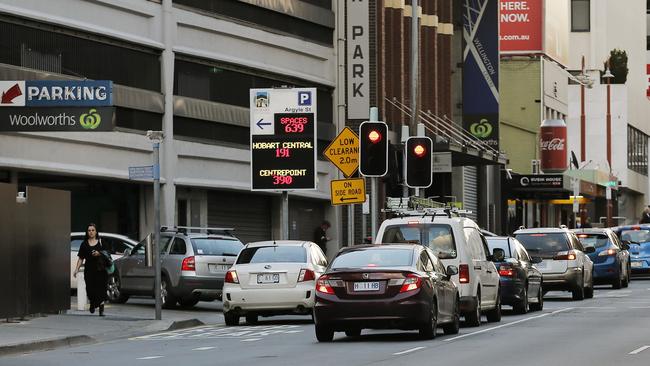
The multi-storey carparks provide a total of 2400 spaces combined.
The offer is part of the Hello Hobart campaign encouraging shoppers to support businesses in the CBD.
HCC accused of treating retailers with ‘contempt’
HOBART City Council has hit back at accusations it is “pressuring” shopkeepers out of the inner city to make way for the University of Tasmania.
The complaints were made at Monday’s council meeting by Confederation of Greater Hobart Business chairwoman Louise Bloomfield.
Ms Bloomfield said she, and other business owners, had been told by council staff that if they didn’t like UTAS moving next to them, they could always relocate.
She said many shopkeepers faced the implicit pressure of “financial ruin” if they did not relocate their businesses.
“I ask that the Hobart City Council please provide the ratepayers of Hobart an explanation of how it is that small business owners can be treated with such utter contempt,” she said.
“Why is it that traders’ contributions are considered less worthy than a near-billion-dollar entity like UTAS. Why are traders being pressured to move at all?”
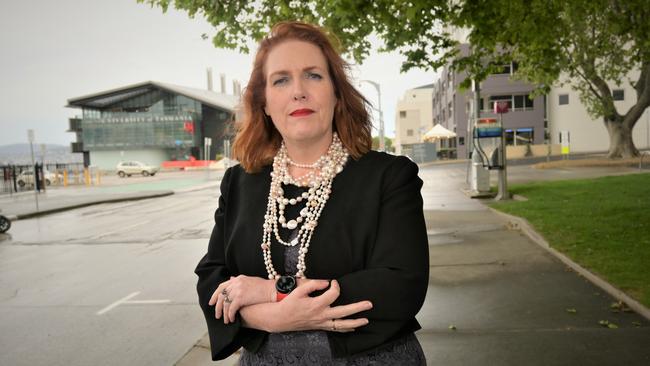
Lord Mayor Anna Reynolds hit back at the suggestion council was pressuring businesses to leave the CBD.
Cr Reynolds said council had to balance the needs of students, shoppers, tourists, workers, businesses and healthcare staff needing to access the inner city.
“There is no doubt that the city is undergoing a significant period of growth and transition, and with this there will be change,” Cr Reynolds said.
“The council cannot, and will not, dictate what small businesses should do and where they should or could conduct business from.”
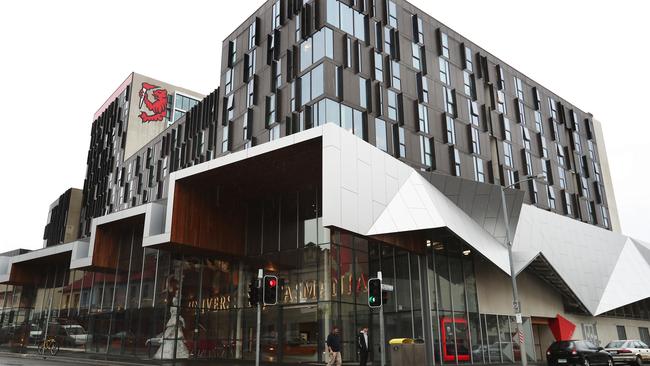
CWA Hobart’s Johanna Warren said they feared being squeezed out of their Elizabeth Street address due to the lack of parking caused by UTAS.
She said many of their customers, donors and volunteers had stopped turning up because of how difficult it was to find a spot.
“With these new parklets out here we have seen a decline, particularly in our elderly long-term customers,” she said.
“It’s all well and good to have people come once every six months, but we used to have them coming every week. They don’t come because the city is so unwelcoming if you drive a car now.”
‘Why less street parking is good for retailers’
The University of Tasmania’s plan for a parklet in the CBD would be beneficial to local retailers, not a hindrance, a Hobart street designer says.
Street making and urban revitalisation specialist Steven Burgess, of Hobart firm Complete Streets, was commissioned by UTAS to undertake a study to inform future development in Hobart.
“There’s been a whole national liveability survey done about what people want in their streets and centres,” Mr Burgess said.
“And Hobart’s come up as one of the ones that wants cars the least.”
Last week the University put its plan for a parklet on Melville Street on pause after backlash from a group of local business operators.
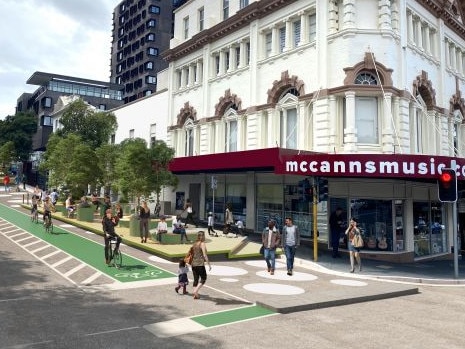
The group feared it would lose parking spots directly in front of businesses, if the parklet was installed, resulting in a drop in customers.
The university said in a statement the opposition was clear and it needed to have deeper conversations with the community.
But Mr Burgess said the concerns raised were at odds with the findings of the study.
He believed the opposition was likely from a small group of people “getting too much attention”.
“In that particular part of town they wanted more activity in the buildings, more living space, more commercial space, night time economy space and more cool, calm and green space,” he said.
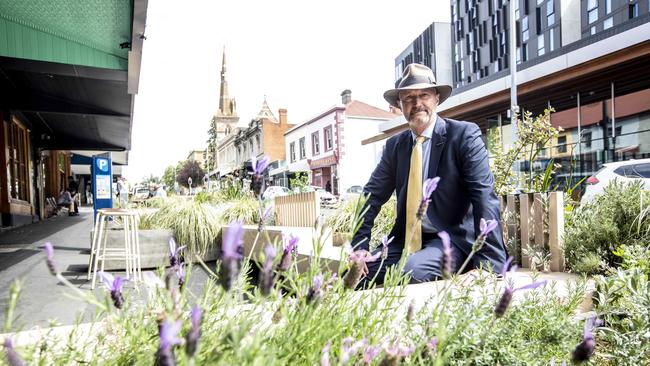
Mr Burgess believed it was actually an oversupply of carparks which could “kill business”.
“Drivers spend a lesser amount of money, people need to walk around, spend more money,” he said.
“The thing we don’t want is where people drive in, park right next to the shop they want and leave again.
“We need them to stop and go to a few places, not just race in and out.
“They think their customers want to do a more convenient thing, but you need them to stay there for a long time.”
He said improving the streetscape would make it more attractive to shoppers.
“So nice long walkable streets, not dominated by cars are going to make them money and that’s what they were going to get.”
Mr Burgess did not believe customers would opt for suburb shopping centres instead of the CBD.
“The average walk in Eastlands is huge because the carparks are a long way away from the shop front,” he said.
UTAS hits pause on its push for a parklet
November 26: The University of Tasmania has put its development application for a parklet on Melville Street on hold, after the plan received backlash from business owners.
Under the proposal, a lane of traffic on Melville Street would be closed to make way for the green spaces.
The plans were part of the University of Tasmania’s campus relocation from Sandy Bay to the Hobart CBD.
The DA was set to go before the Hobart Planning Committee on November 29.
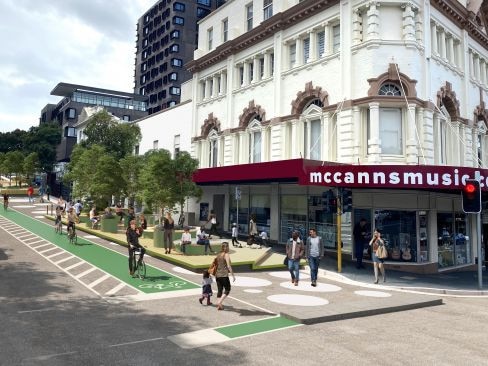
But last week, business owners voiced outrage over the proposal, claiming it would result in fewer parking spots in the area and subsequently affect their trade.
University of Tasmania vice chancellor Rufus Black said the application was being paused to “to reflect on community feedback and await the arrival of the City of Hobart’s precinct plan.”
“During the consultation that shaped that our plans for the city, streets users said they wanted to see more greenery, street furniture and activation,” Prof. Black said.
“We embarked on this project because there was strong support for this sort of amenity in the city.
“As plans developed, that translated into support for the parklet and the chance to test this approach – but there is clearly opposition so we need to pause.
“It has become clear that we need to have a deeper conversation with the community.”
Prof Black said the University would “work to ensure its plans aligned with the City of Hobart’s new precinct plan.”
“We are committed to enhancing what makes Hobart special by making very sustainable, human scaled buildings that make that higher education more accessible to more people and enhance the vibrancy and life of the city,” Mr Black said.
Property owner Denis McLoughlin who spearheaded the fight against the proposal said business owners wouldn’t feel safe until the development application was completely withdrawn.
“Melville Street is still under threat,” Mr McLoughlin said.
“I believe they will have another go.
“It needs to be completely withdrawn and the business owners of Hobart need to be promised that they will never try and steal our street again or anybody else’s.”
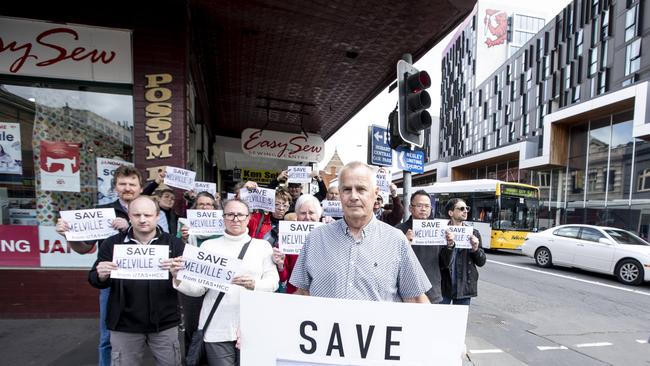
Mr McLoughlin said the community would be prepared when the issue arose again.
“We will form a group so when the spruikers from UTAS try again, this time will all know about it and we will be able to have the right information for everybody,” he said.
“Our businesses cannot afford to lose on street parking.”




